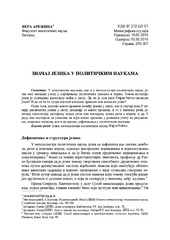Приказ основних података о документу
The importance of language in political sciences
Značaj jezika u političkim naukama
| dc.creator | Arežina, Vera | |
| dc.date.accessioned | 2021-04-02T12:17:00Z | |
| dc.date.available | 2021-04-02T12:17:00Z | |
| dc.date.issued | 2016 | |
| dc.identifier.issn | 1820-4589 | |
| dc.identifier.uri | http://rfpn.fpn.bg.ac.rs/handle/123456789/590 | |
| dc.description.abstract | After defining language as system of symbols, words and linguistic expressions, as well as the part of the culture, we pointed out the classification, and essential changes in many languages worldwide. Many contemporary languages can be classified to the spoken languages, languages in specific sciences (political sciences, economy, medicine, etc.), artificial languages(language of symbols, such as Esperanto or any programming language - Basic, Pascal, SQL, SPSS, C, Java, etc.) as well as a meta-language (more precisely in meaning of the statement). In various languages in the world, many changes have been already happened such as: changes in the meaning of the words (democracy, profile), or disappearance of some words, because specific political phenomena, process or services have disappeared (self-management organizations and communities, social ownership, floppy disk, etc.). Also, changes in languages are formation of new words and phrases regarding new political phenomena or processes (globalization, screening, monitoring, extremism), and most of those words are derived from the English language, often without translation to a particular language (computers, internet, communication). And finally, changes regarding linguistic typology, according different criteria - geography (localizm, dialects) occupation or education level. Due to geography criteria, English language can differ from standard American English, English at the universities Oxford and Cambridge, Australian English, and cockney to the Indian English, African-American English, or jacket English. In political sciences, as well in the methodology of political sciences, the language has great importance in determination of political process or phenomena, as well as their meaning and definition. Although there are problems related to the meaning of words and linguistic expressions in social and political sciences, some authors have clear and precise wording, such as Slobodan Jovanovic, Henry Kissinger, Zbigniew Brzezinski, Joseph Nyeand others. Throughout civilization, the language has reflected the distribution of power in the world. It is still considered that English language is lingua franca, the most popular language worldwide. However, it is estimated that the majority of world population will use other languages such as Chinese, Hindi, Spanish and Arabic by 2050. According to estimates linguist, there are approximately 6,000 existing languages but many languages of small communities will rapidly disappear during the 21st century. Also, many countries have taken certain measures to protect their languages, such as establishing the Fund for endangered languages or the Foundation for Endangered Languages. However, in the process of Serbia's EU accession, Serbian language includes many naturalizations (enlargement, comitology, screening, monitoring, etc.), and that can create even bigger problems, and certainly will not contribute to a better understanding and defining the terms in political and other social sciences. Beside, in political science there are many problems relating to the determination of the definition, meaning, and the implementation of several methods in the framework of the methodology of political science - comparative, statistical, and in particular, the data analysis. In the Republic of Serbia, insufficiently efforts have made to preserve the Serbian language and alphabet. Several years ago a law on the official use of Serbian language and alphabet has been adopted, and several associations such as the National Council for Serbian language and alphabet, Serbian association 'Cyrillic' and other advocates for the preservation of Serbian language, the official and public use of the Cyrillic alphabet. Also, in the Republic of Serbia has been adopted the European Charter for Regional or Minority Languages where ten languages have been alleged, such as Albanian, Bosnian, Bulgarian, Croatian, Hungarian, Romanian, Slovak and others. | en |
| dc.description.abstract | U političkim naukama, kao i u metodologiji političkih nauka, jezik ima značajnu ulogu u određivanju političkih procesa i pojava. Tokom istorije, jezik je oslikavao raspodelu moći u svetu. Da li je još uvek lingua franca engleski jezik? I da li će to sutra postati kineski, arapski ili španski jezik? Osim toga, postoje mnoge promene između jezika u svetu, kao i unutar njih.U okviru različitih jezika u svetu dešavaju se mnoge promene, i to u značenju reči, jezičkoj tipologiji, nestajanju nekih reči ili nastajanju novih reči i izraza, i dr. U radu smo nastojali da ukažemo na koji način promene u jezicima utiču na razumevanje, shvatanje pojmova, ali i na proces definisanja u političkim naukama. | sr |
| dc.publisher | Kultura - Polis Novi Sad i Institut za evropske studije, Beograd | |
| dc.rights | openAccess | |
| dc.source | Kultura polisa | |
| dc.subject | language | en |
| dc.subject | methodology of political sciences | en |
| dc.subject | lingua franca | en |
| dc.subject | jezik | sr |
| dc.subject | metodologija političkih nauka | sr |
| dc.subject | lingua franca | sr |
| dc.title | The importance of language in political sciences | en |
| dc.title | Značaj jezika u političkim naukama | sr |
| dc.type | article | |
| dc.rights.license | ARR | |
| dc.citation.epage | 307 | |
| dc.citation.issue | 29 | |
| dc.citation.other | 13(29): 295-307 | |
| dc.citation.rank | M51 | |
| dc.citation.spage | 295 | |
| dc.citation.volume | 13 | |
| dc.identifier.fulltext | http://rfpn.fpn.bg.ac.rs/bitstream/id/394/587.pdf | |
| dc.identifier.rcub | https://hdl.handle.net/21.15107/rcub_rfpn_590 | |
| dc.type.version | publishedVersion |

